Management Accounting Analysis of Unilever: Cost and Planning
VerifiedAdded on 2023/02/02
|14
|4377
|41
Report
AI Summary
This report provides a comprehensive analysis of Unilever's management accounting practices. It begins with an overview of management accounting systems, differentiating them from financial accounting and exploring various types like activity-based management, strategic management accounting, and the balanced scorecard. The report then delves into the application of these techniques within Unilever, examining cost determination processes, including marginal and absorption costing methods. Furthermore, it explores the planning tools used for budgetary control and compares Unilever's approaches to financial problem-solving with those of Nestle. The report highlights Unilever's organizational structure, its use of strategic management accounting, and its integration of management accounting information systems. The analysis also includes a critical evaluation of the integration between accounting systems and reporting, emphasizing the alignment with organizational goals and decision-making processes.
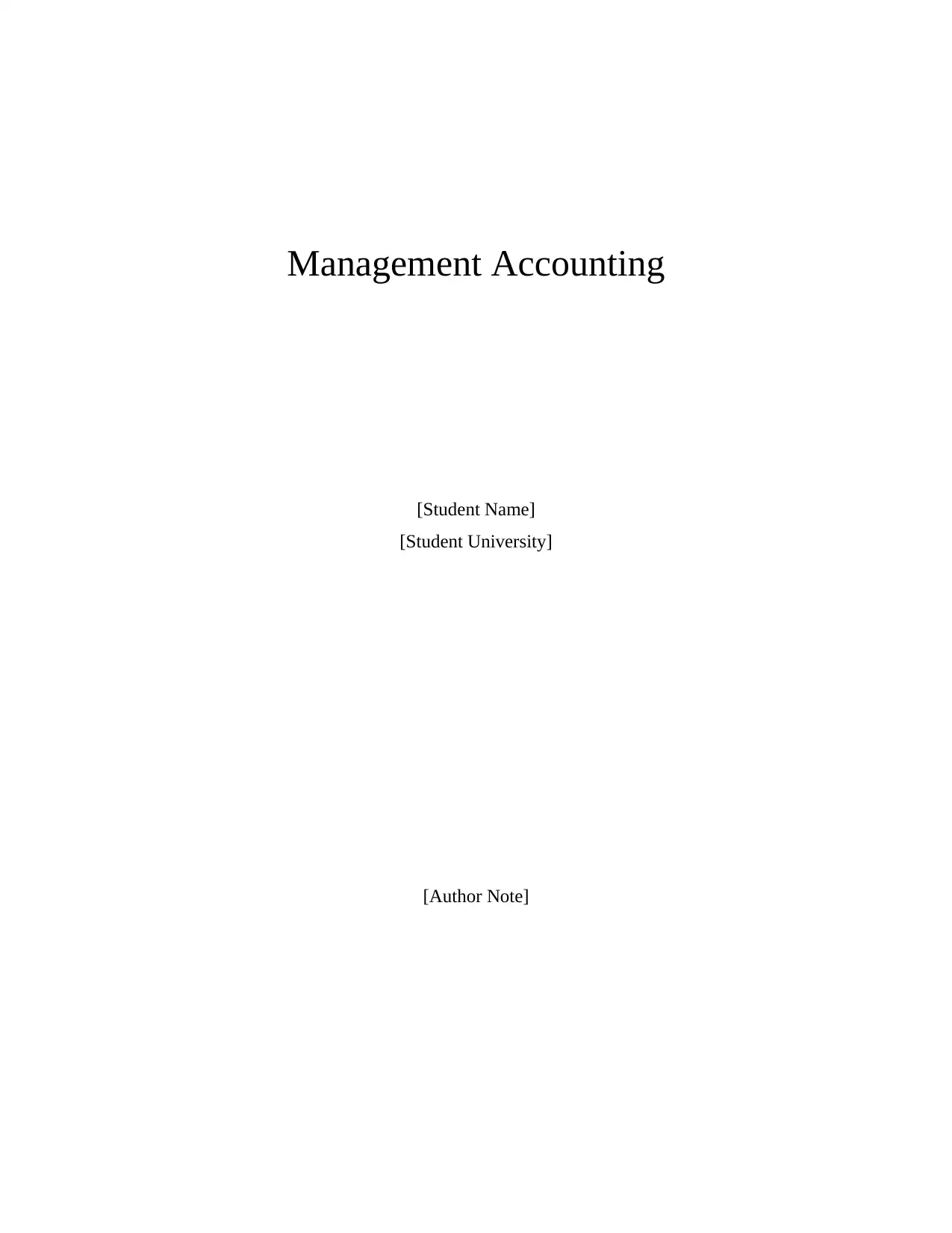
Management Accounting
[Student Name]
[Student University]
[Author Note]
[Student Name]
[Student University]
[Author Note]
Paraphrase This Document
Need a fresh take? Get an instant paraphrase of this document with our AI Paraphraser
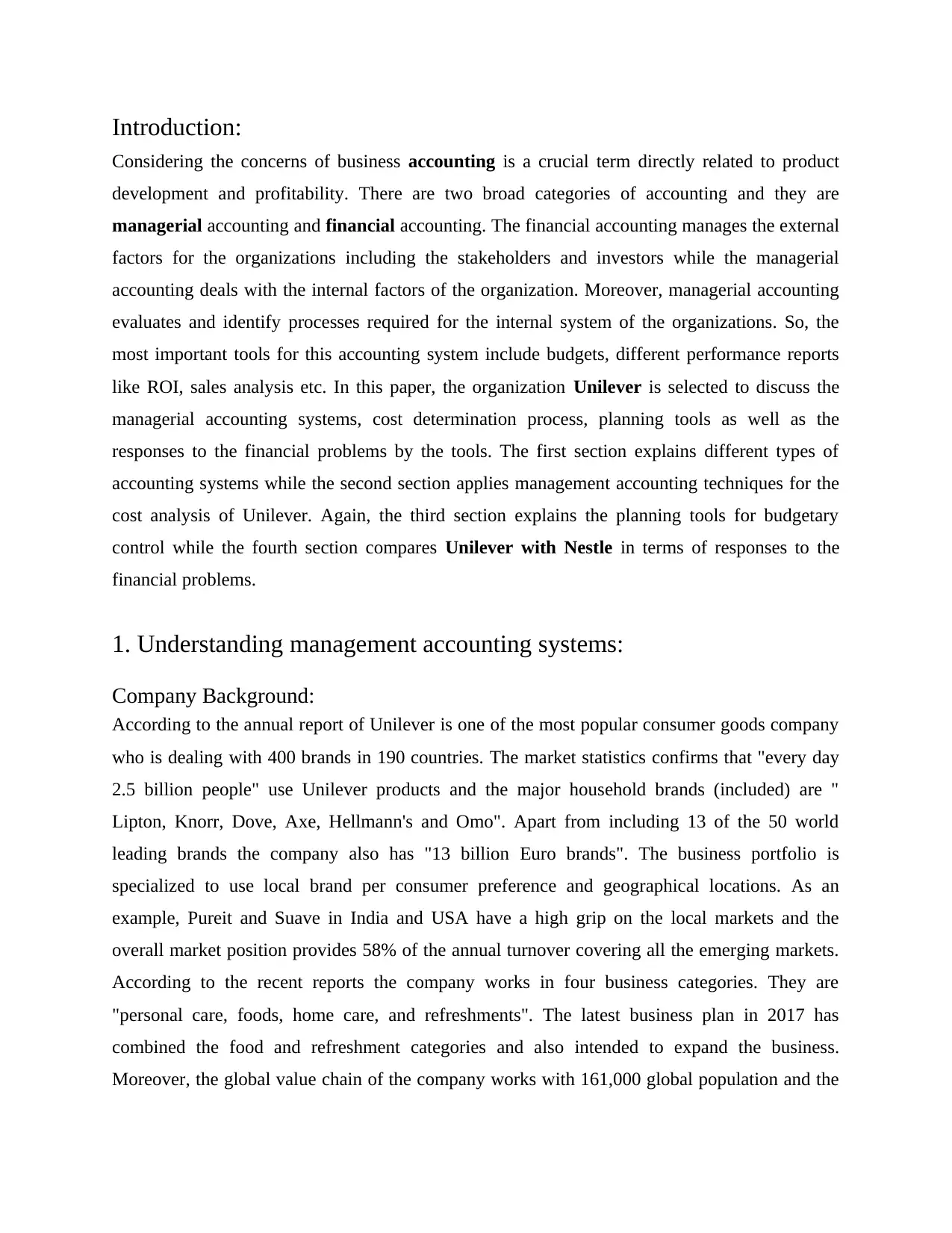
Introduction:
Considering the concerns of business accounting is a crucial term directly related to product
development and profitability. There are two broad categories of accounting and they are
managerial accounting and financial accounting. The financial accounting manages the external
factors for the organizations including the stakeholders and investors while the managerial
accounting deals with the internal factors of the organization. Moreover, managerial accounting
evaluates and identify processes required for the internal system of the organizations. So, the
most important tools for this accounting system include budgets, different performance reports
like ROI, sales analysis etc. In this paper, the organization Unilever is selected to discuss the
managerial accounting systems, cost determination process, planning tools as well as the
responses to the financial problems by the tools. The first section explains different types of
accounting systems while the second section applies management accounting techniques for the
cost analysis of Unilever. Again, the third section explains the planning tools for budgetary
control while the fourth section compares Unilever with Nestle in terms of responses to the
financial problems.
1. Understanding management accounting systems:
Company Background:
According to the annual report of Unilever is one of the most popular consumer goods company
who is dealing with 400 brands in 190 countries. The market statistics confirms that "every day
2.5 billion people" use Unilever products and the major household brands (included) are "
Lipton, Knorr, Dove, Axe, Hellmann's and Omo". Apart from including 13 of the 50 world
leading brands the company also has "13 billion Euro brands". The business portfolio is
specialized to use local brand per consumer preference and geographical locations. As an
example, Pureit and Suave in India and USA have a high grip on the local markets and the
overall market position provides 58% of the annual turnover covering all the emerging markets.
According to the recent reports the company works in four business categories. They are
"personal care, foods, home care, and refreshments". The latest business plan in 2017 has
combined the food and refreshment categories and also intended to expand the business.
Moreover, the global value chain of the company works with 161,000 global population and the
Considering the concerns of business accounting is a crucial term directly related to product
development and profitability. There are two broad categories of accounting and they are
managerial accounting and financial accounting. The financial accounting manages the external
factors for the organizations including the stakeholders and investors while the managerial
accounting deals with the internal factors of the organization. Moreover, managerial accounting
evaluates and identify processes required for the internal system of the organizations. So, the
most important tools for this accounting system include budgets, different performance reports
like ROI, sales analysis etc. In this paper, the organization Unilever is selected to discuss the
managerial accounting systems, cost determination process, planning tools as well as the
responses to the financial problems by the tools. The first section explains different types of
accounting systems while the second section applies management accounting techniques for the
cost analysis of Unilever. Again, the third section explains the planning tools for budgetary
control while the fourth section compares Unilever with Nestle in terms of responses to the
financial problems.
1. Understanding management accounting systems:
Company Background:
According to the annual report of Unilever is one of the most popular consumer goods company
who is dealing with 400 brands in 190 countries. The market statistics confirms that "every day
2.5 billion people" use Unilever products and the major household brands (included) are "
Lipton, Knorr, Dove, Axe, Hellmann's and Omo". Apart from including 13 of the 50 world
leading brands the company also has "13 billion Euro brands". The business portfolio is
specialized to use local brand per consumer preference and geographical locations. As an
example, Pureit and Suave in India and USA have a high grip on the local markets and the
overall market position provides 58% of the annual turnover covering all the emerging markets.
According to the recent reports the company works in four business categories. They are
"personal care, foods, home care, and refreshments". The latest business plan in 2017 has
combined the food and refreshment categories and also intended to expand the business.
Moreover, the global value chain of the company works with 161,000 global population and the
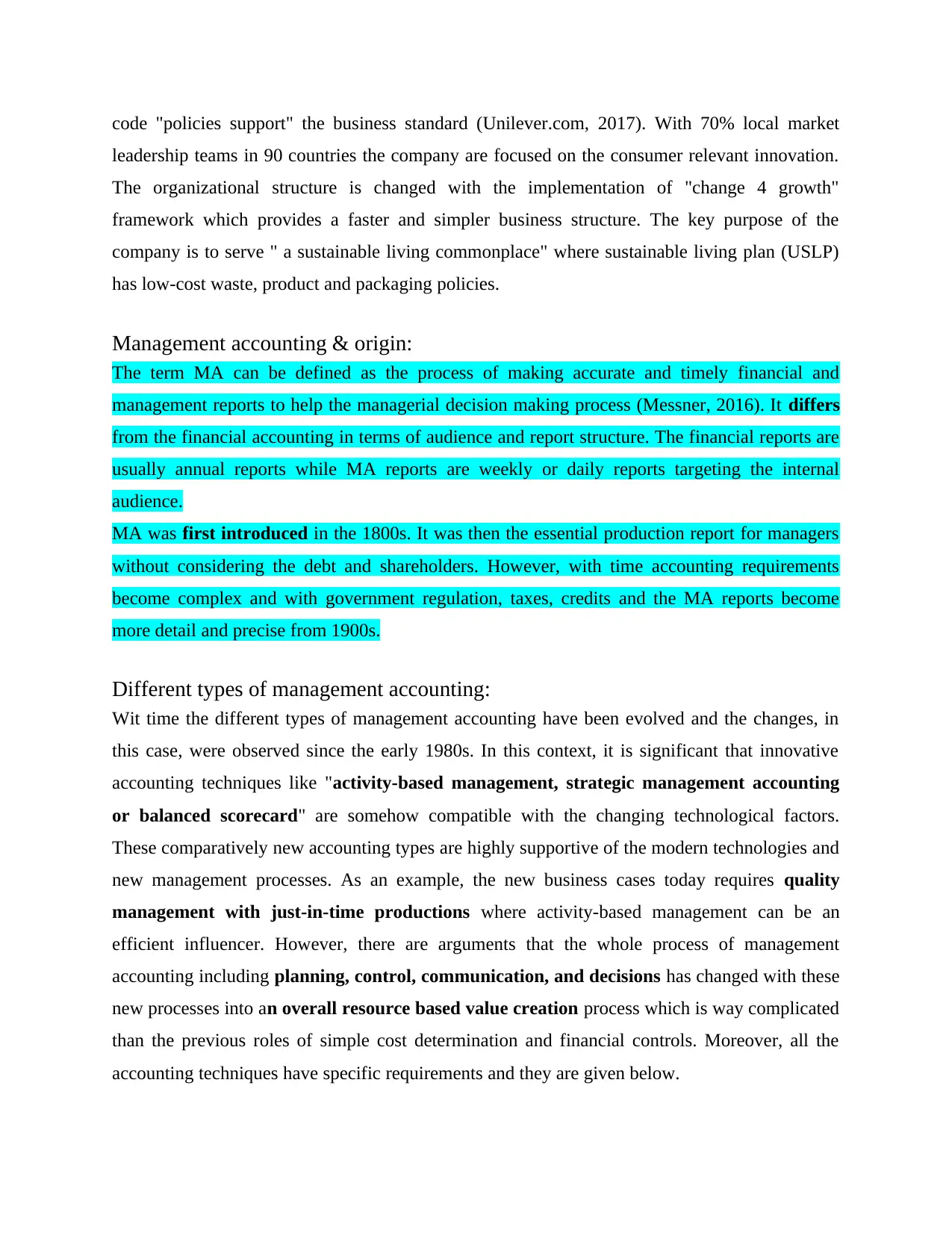
code "policies support" the business standard (Unilever.com, 2017). With 70% local market
leadership teams in 90 countries the company are focused on the consumer relevant innovation.
The organizational structure is changed with the implementation of "change 4 growth"
framework which provides a faster and simpler business structure. The key purpose of the
company is to serve " a sustainable living commonplace" where sustainable living plan (USLP)
has low-cost waste, product and packaging policies.
Management accounting & origin:
The term MA can be defined as the process of making accurate and timely financial and
management reports to help the managerial decision making process (Messner, 2016). It differs
from the financial accounting in terms of audience and report structure. The financial reports are
usually annual reports while MA reports are weekly or daily reports targeting the internal
audience.
MA was first introduced in the 1800s. It was then the essential production report for managers
without considering the debt and shareholders. However, with time accounting requirements
become complex and with government regulation, taxes, credits and the MA reports become
more detail and precise from 1900s.
Different types of management accounting:
Wit time the different types of management accounting have been evolved and the changes, in
this case, were observed since the early 1980s. In this context, it is significant that innovative
accounting techniques like "activity-based management, strategic management accounting
or balanced scorecard" are somehow compatible with the changing technological factors.
These comparatively new accounting types are highly supportive of the modern technologies and
new management processes. As an example, the new business cases today requires quality
management with just-in-time productions where activity-based management can be an
efficient influencer. However, there are arguments that the whole process of management
accounting including planning, control, communication, and decisions has changed with these
new processes into an overall resource based value creation process which is way complicated
than the previous roles of simple cost determination and financial controls. Moreover, all the
accounting techniques have specific requirements and they are given below.
leadership teams in 90 countries the company are focused on the consumer relevant innovation.
The organizational structure is changed with the implementation of "change 4 growth"
framework which provides a faster and simpler business structure. The key purpose of the
company is to serve " a sustainable living commonplace" where sustainable living plan (USLP)
has low-cost waste, product and packaging policies.
Management accounting & origin:
The term MA can be defined as the process of making accurate and timely financial and
management reports to help the managerial decision making process (Messner, 2016). It differs
from the financial accounting in terms of audience and report structure. The financial reports are
usually annual reports while MA reports are weekly or daily reports targeting the internal
audience.
MA was first introduced in the 1800s. It was then the essential production report for managers
without considering the debt and shareholders. However, with time accounting requirements
become complex and with government regulation, taxes, credits and the MA reports become
more detail and precise from 1900s.
Different types of management accounting:
Wit time the different types of management accounting have been evolved and the changes, in
this case, were observed since the early 1980s. In this context, it is significant that innovative
accounting techniques like "activity-based management, strategic management accounting
or balanced scorecard" are somehow compatible with the changing technological factors.
These comparatively new accounting types are highly supportive of the modern technologies and
new management processes. As an example, the new business cases today requires quality
management with just-in-time productions where activity-based management can be an
efficient influencer. However, there are arguments that the whole process of management
accounting including planning, control, communication, and decisions has changed with these
new processes into an overall resource based value creation process which is way complicated
than the previous roles of simple cost determination and financial controls. Moreover, all the
accounting techniques have specific requirements and they are given below.
⊘ This is a preview!⊘
Do you want full access?
Subscribe today to unlock all pages.

Trusted by 1+ million students worldwide
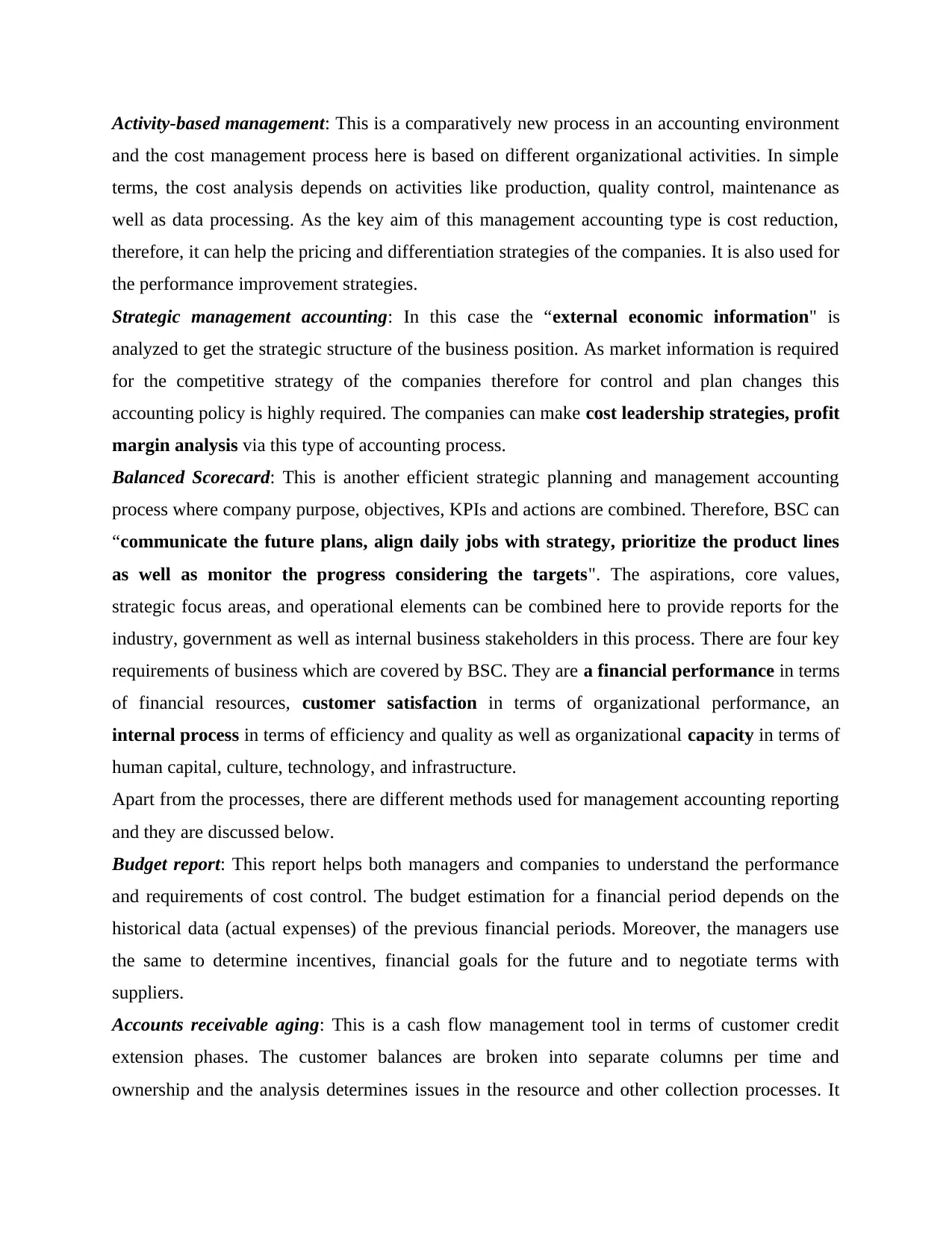
Activity-based management: This is a comparatively new process in an accounting environment
and the cost management process here is based on different organizational activities. In simple
terms, the cost analysis depends on activities like production, quality control, maintenance as
well as data processing. As the key aim of this management accounting type is cost reduction,
therefore, it can help the pricing and differentiation strategies of the companies. It is also used for
the performance improvement strategies.
Strategic management accounting: In this case the “external economic information" is
analyzed to get the strategic structure of the business position. As market information is required
for the competitive strategy of the companies therefore for control and plan changes this
accounting policy is highly required. The companies can make cost leadership strategies, profit
margin analysis via this type of accounting process.
Balanced Scorecard: This is another efficient strategic planning and management accounting
process where company purpose, objectives, KPIs and actions are combined. Therefore, BSC can
“communicate the future plans, align daily jobs with strategy, prioritize the product lines
as well as monitor the progress considering the targets". The aspirations, core values,
strategic focus areas, and operational elements can be combined here to provide reports for the
industry, government as well as internal business stakeholders in this process. There are four key
requirements of business which are covered by BSC. They are a financial performance in terms
of financial resources, customer satisfaction in terms of organizational performance, an
internal process in terms of efficiency and quality as well as organizational capacity in terms of
human capital, culture, technology, and infrastructure.
Apart from the processes, there are different methods used for management accounting reporting
and they are discussed below.
Budget report: This report helps both managers and companies to understand the performance
and requirements of cost control. The budget estimation for a financial period depends on the
historical data (actual expenses) of the previous financial periods. Moreover, the managers use
the same to determine incentives, financial goals for the future and to negotiate terms with
suppliers.
Accounts receivable aging: This is a cash flow management tool in terms of customer credit
extension phases. The customer balances are broken into separate columns per time and
ownership and the analysis determines issues in the resource and other collection processes. It
and the cost management process here is based on different organizational activities. In simple
terms, the cost analysis depends on activities like production, quality control, maintenance as
well as data processing. As the key aim of this management accounting type is cost reduction,
therefore, it can help the pricing and differentiation strategies of the companies. It is also used for
the performance improvement strategies.
Strategic management accounting: In this case the “external economic information" is
analyzed to get the strategic structure of the business position. As market information is required
for the competitive strategy of the companies therefore for control and plan changes this
accounting policy is highly required. The companies can make cost leadership strategies, profit
margin analysis via this type of accounting process.
Balanced Scorecard: This is another efficient strategic planning and management accounting
process where company purpose, objectives, KPIs and actions are combined. Therefore, BSC can
“communicate the future plans, align daily jobs with strategy, prioritize the product lines
as well as monitor the progress considering the targets". The aspirations, core values,
strategic focus areas, and operational elements can be combined here to provide reports for the
industry, government as well as internal business stakeholders in this process. There are four key
requirements of business which are covered by BSC. They are a financial performance in terms
of financial resources, customer satisfaction in terms of organizational performance, an
internal process in terms of efficiency and quality as well as organizational capacity in terms of
human capital, culture, technology, and infrastructure.
Apart from the processes, there are different methods used for management accounting reporting
and they are discussed below.
Budget report: This report helps both managers and companies to understand the performance
and requirements of cost control. The budget estimation for a financial period depends on the
historical data (actual expenses) of the previous financial periods. Moreover, the managers use
the same to determine incentives, financial goals for the future and to negotiate terms with
suppliers.
Accounts receivable aging: This is a cash flow management tool in terms of customer credit
extension phases. The customer balances are broken into separate columns per time and
ownership and the analysis determines issues in the resource and other collection processes. It
Paraphrase This Document
Need a fresh take? Get an instant paraphrase of this document with our AI Paraphraser
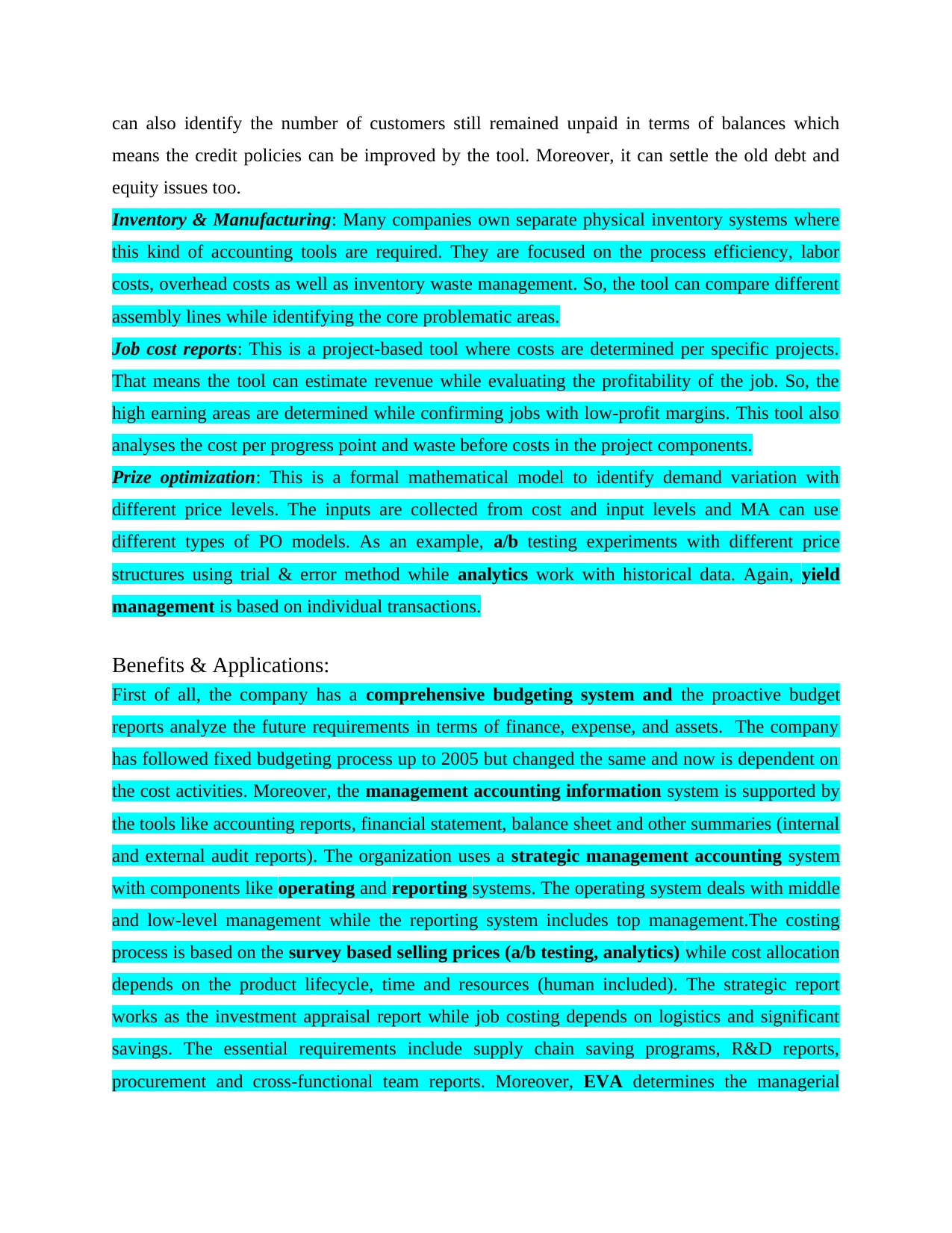
can also identify the number of customers still remained unpaid in terms of balances which
means the credit policies can be improved by the tool. Moreover, it can settle the old debt and
equity issues too.
Inventory & Manufacturing: Many companies own separate physical inventory systems where
this kind of accounting tools are required. They are focused on the process efficiency, labor
costs, overhead costs as well as inventory waste management. So, the tool can compare different
assembly lines while identifying the core problematic areas.
Job cost reports: This is a project-based tool where costs are determined per specific projects.
That means the tool can estimate revenue while evaluating the profitability of the job. So, the
high earning areas are determined while confirming jobs with low-profit margins. This tool also
analyses the cost per progress point and waste before costs in the project components.
Prize optimization: This is a formal mathematical model to identify demand variation with
different price levels. The inputs are collected from cost and input levels and MA can use
different types of PO models. As an example, a/b testing experiments with different price
structures using trial & error method while analytics work with historical data. Again, yield
management is based on individual transactions.
Benefits & Applications:
First of all, the company has a comprehensive budgeting system and the proactive budget
reports analyze the future requirements in terms of finance, expense, and assets. The company
has followed fixed budgeting process up to 2005 but changed the same and now is dependent on
the cost activities. Moreover, the management accounting information system is supported by
the tools like accounting reports, financial statement, balance sheet and other summaries (internal
and external audit reports). The organization uses a strategic management accounting system
with components like operating and reporting systems. The operating system deals with middle
and low-level management while the reporting system includes top management.The costing
process is based on the survey based selling prices (a/b testing, analytics) while cost allocation
depends on the product lifecycle, time and resources (human included). The strategic report
works as the investment appraisal report while job costing depends on logistics and significant
savings. The essential requirements include supply chain saving programs, R&D reports,
procurement and cross-functional team reports. Moreover, EVA determines the managerial
means the credit policies can be improved by the tool. Moreover, it can settle the old debt and
equity issues too.
Inventory & Manufacturing: Many companies own separate physical inventory systems where
this kind of accounting tools are required. They are focused on the process efficiency, labor
costs, overhead costs as well as inventory waste management. So, the tool can compare different
assembly lines while identifying the core problematic areas.
Job cost reports: This is a project-based tool where costs are determined per specific projects.
That means the tool can estimate revenue while evaluating the profitability of the job. So, the
high earning areas are determined while confirming jobs with low-profit margins. This tool also
analyses the cost per progress point and waste before costs in the project components.
Prize optimization: This is a formal mathematical model to identify demand variation with
different price levels. The inputs are collected from cost and input levels and MA can use
different types of PO models. As an example, a/b testing experiments with different price
structures using trial & error method while analytics work with historical data. Again, yield
management is based on individual transactions.
Benefits & Applications:
First of all, the company has a comprehensive budgeting system and the proactive budget
reports analyze the future requirements in terms of finance, expense, and assets. The company
has followed fixed budgeting process up to 2005 but changed the same and now is dependent on
the cost activities. Moreover, the management accounting information system is supported by
the tools like accounting reports, financial statement, balance sheet and other summaries (internal
and external audit reports). The organization uses a strategic management accounting system
with components like operating and reporting systems. The operating system deals with middle
and low-level management while the reporting system includes top management.The costing
process is based on the survey based selling prices (a/b testing, analytics) while cost allocation
depends on the product lifecycle, time and resources (human included). The strategic report
works as the investment appraisal report while job costing depends on logistics and significant
savings. The essential requirements include supply chain saving programs, R&D reports,
procurement and cross-functional team reports. Moreover, EVA determines the managerial
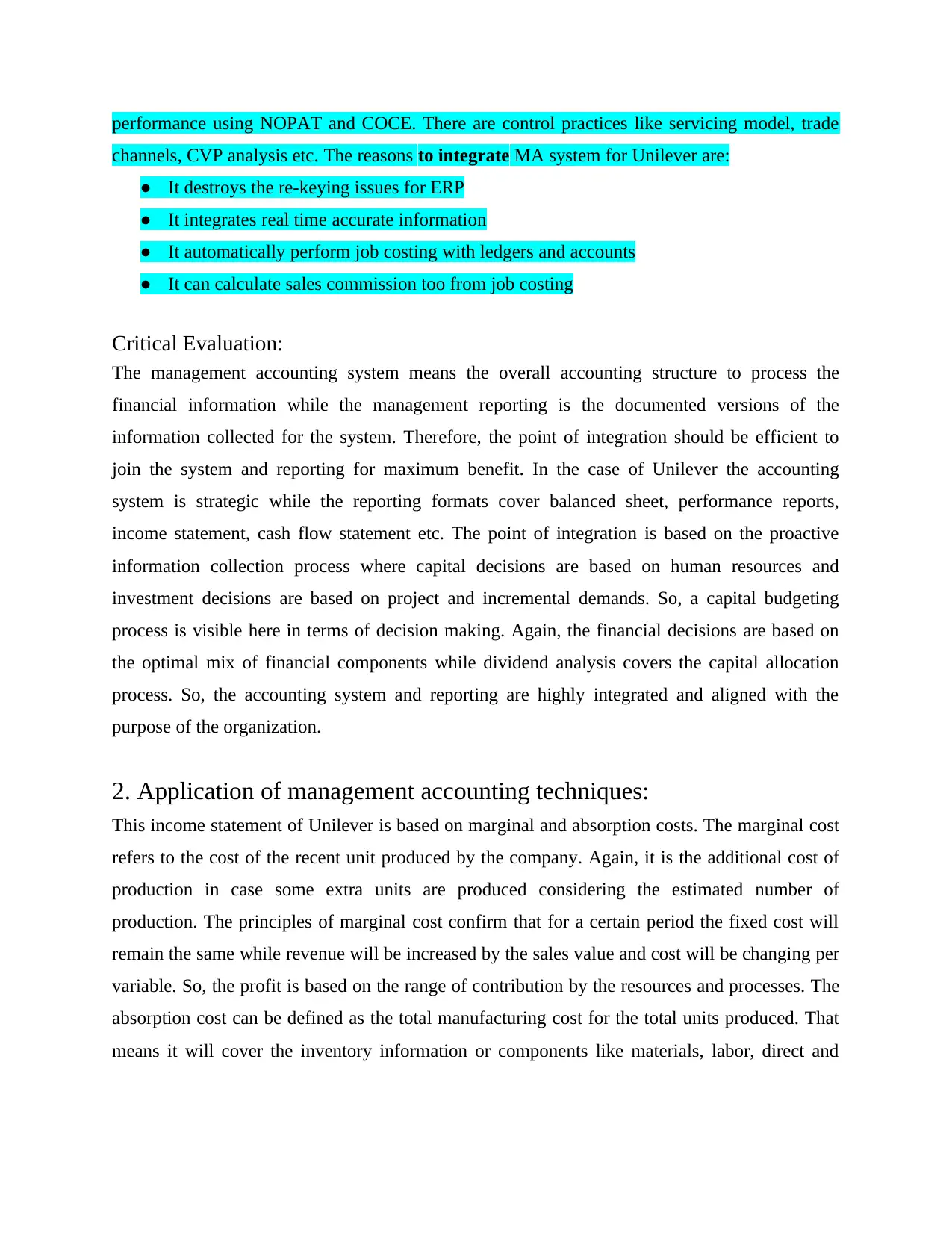
performance using NOPAT and COCE. There are control practices like servicing model, trade
channels, CVP analysis etc. The reasons to integrate MA system for Unilever are:
● It destroys the re-keying issues for ERP
● It integrates real time accurate information
● It automatically perform job costing with ledgers and accounts
● It can calculate sales commission too from job costing
Critical Evaluation:
The management accounting system means the overall accounting structure to process the
financial information while the management reporting is the documented versions of the
information collected for the system. Therefore, the point of integration should be efficient to
join the system and reporting for maximum benefit. In the case of Unilever the accounting
system is strategic while the reporting formats cover balanced sheet, performance reports,
income statement, cash flow statement etc. The point of integration is based on the proactive
information collection process where capital decisions are based on human resources and
investment decisions are based on project and incremental demands. So, a capital budgeting
process is visible here in terms of decision making. Again, the financial decisions are based on
the optimal mix of financial components while dividend analysis covers the capital allocation
process. So, the accounting system and reporting are highly integrated and aligned with the
purpose of the organization.
2. Application of management accounting techniques:
This income statement of Unilever is based on marginal and absorption costs. The marginal cost
refers to the cost of the recent unit produced by the company. Again, it is the additional cost of
production in case some extra units are produced considering the estimated number of
production. The principles of marginal cost confirm that for a certain period the fixed cost will
remain the same while revenue will be increased by the sales value and cost will be changing per
variable. So, the profit is based on the range of contribution by the resources and processes. The
absorption cost can be defined as the total manufacturing cost for the total units produced. That
means it will cover the inventory information or components like materials, labor, direct and
channels, CVP analysis etc. The reasons to integrate MA system for Unilever are:
● It destroys the re-keying issues for ERP
● It integrates real time accurate information
● It automatically perform job costing with ledgers and accounts
● It can calculate sales commission too from job costing
Critical Evaluation:
The management accounting system means the overall accounting structure to process the
financial information while the management reporting is the documented versions of the
information collected for the system. Therefore, the point of integration should be efficient to
join the system and reporting for maximum benefit. In the case of Unilever the accounting
system is strategic while the reporting formats cover balanced sheet, performance reports,
income statement, cash flow statement etc. The point of integration is based on the proactive
information collection process where capital decisions are based on human resources and
investment decisions are based on project and incremental demands. So, a capital budgeting
process is visible here in terms of decision making. Again, the financial decisions are based on
the optimal mix of financial components while dividend analysis covers the capital allocation
process. So, the accounting system and reporting are highly integrated and aligned with the
purpose of the organization.
2. Application of management accounting techniques:
This income statement of Unilever is based on marginal and absorption costs. The marginal cost
refers to the cost of the recent unit produced by the company. Again, it is the additional cost of
production in case some extra units are produced considering the estimated number of
production. The principles of marginal cost confirm that for a certain period the fixed cost will
remain the same while revenue will be increased by the sales value and cost will be changing per
variable. So, the profit is based on the range of contribution by the resources and processes. The
absorption cost can be defined as the total manufacturing cost for the total units produced. That
means it will cover the inventory information or components like materials, labor, direct and
⊘ This is a preview!⊘
Do you want full access?
Subscribe today to unlock all pages.

Trusted by 1+ million students worldwide
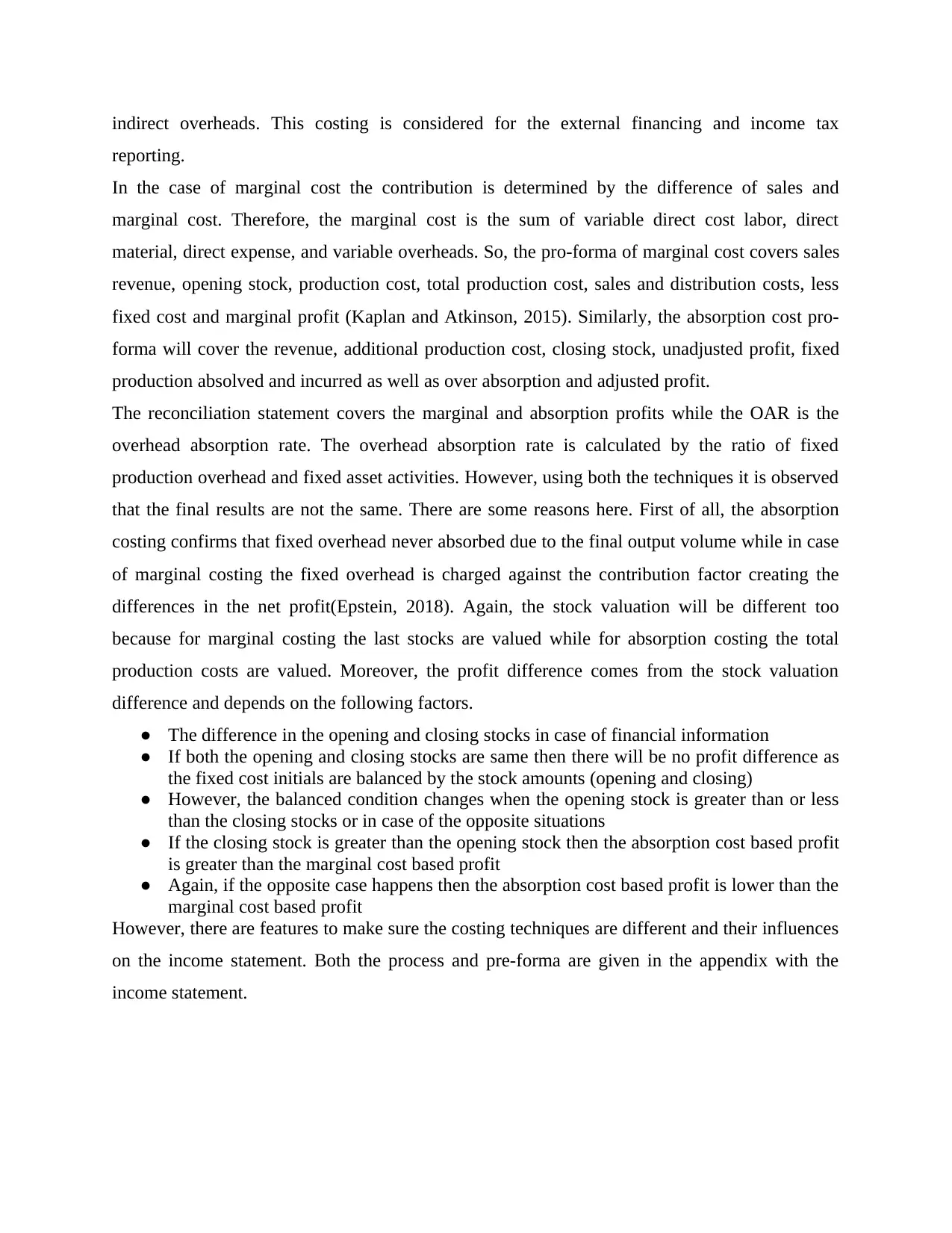
indirect overheads. This costing is considered for the external financing and income tax
reporting.
In the case of marginal cost the contribution is determined by the difference of sales and
marginal cost. Therefore, the marginal cost is the sum of variable direct cost labor, direct
material, direct expense, and variable overheads. So, the pro-forma of marginal cost covers sales
revenue, opening stock, production cost, total production cost, sales and distribution costs, less
fixed cost and marginal profit (Kaplan and Atkinson, 2015). Similarly, the absorption cost pro-
forma will cover the revenue, additional production cost, closing stock, unadjusted profit, fixed
production absolved and incurred as well as over absorption and adjusted profit.
The reconciliation statement covers the marginal and absorption profits while the OAR is the
overhead absorption rate. The overhead absorption rate is calculated by the ratio of fixed
production overhead and fixed asset activities. However, using both the techniques it is observed
that the final results are not the same. There are some reasons here. First of all, the absorption
costing confirms that fixed overhead never absorbed due to the final output volume while in case
of marginal costing the fixed overhead is charged against the contribution factor creating the
differences in the net profit(Epstein, 2018). Again, the stock valuation will be different too
because for marginal costing the last stocks are valued while for absorption costing the total
production costs are valued. Moreover, the profit difference comes from the stock valuation
difference and depends on the following factors.
● The difference in the opening and closing stocks in case of financial information
● If both the opening and closing stocks are same then there will be no profit difference as
the fixed cost initials are balanced by the stock amounts (opening and closing)
● However, the balanced condition changes when the opening stock is greater than or less
than the closing stocks or in case of the opposite situations
● If the closing stock is greater than the opening stock then the absorption cost based profit
is greater than the marginal cost based profit
● Again, if the opposite case happens then the absorption cost based profit is lower than the
marginal cost based profit
However, there are features to make sure the costing techniques are different and their influences
on the income statement. Both the process and pre-forma are given in the appendix with the
income statement.
reporting.
In the case of marginal cost the contribution is determined by the difference of sales and
marginal cost. Therefore, the marginal cost is the sum of variable direct cost labor, direct
material, direct expense, and variable overheads. So, the pro-forma of marginal cost covers sales
revenue, opening stock, production cost, total production cost, sales and distribution costs, less
fixed cost and marginal profit (Kaplan and Atkinson, 2015). Similarly, the absorption cost pro-
forma will cover the revenue, additional production cost, closing stock, unadjusted profit, fixed
production absolved and incurred as well as over absorption and adjusted profit.
The reconciliation statement covers the marginal and absorption profits while the OAR is the
overhead absorption rate. The overhead absorption rate is calculated by the ratio of fixed
production overhead and fixed asset activities. However, using both the techniques it is observed
that the final results are not the same. There are some reasons here. First of all, the absorption
costing confirms that fixed overhead never absorbed due to the final output volume while in case
of marginal costing the fixed overhead is charged against the contribution factor creating the
differences in the net profit(Epstein, 2018). Again, the stock valuation will be different too
because for marginal costing the last stocks are valued while for absorption costing the total
production costs are valued. Moreover, the profit difference comes from the stock valuation
difference and depends on the following factors.
● The difference in the opening and closing stocks in case of financial information
● If both the opening and closing stocks are same then there will be no profit difference as
the fixed cost initials are balanced by the stock amounts (opening and closing)
● However, the balanced condition changes when the opening stock is greater than or less
than the closing stocks or in case of the opposite situations
● If the closing stock is greater than the opening stock then the absorption cost based profit
is greater than the marginal cost based profit
● Again, if the opposite case happens then the absorption cost based profit is lower than the
marginal cost based profit
However, there are features to make sure the costing techniques are different and their influences
on the income statement. Both the process and pre-forma are given in the appendix with the
income statement.
Paraphrase This Document
Need a fresh take? Get an instant paraphrase of this document with our AI Paraphraser
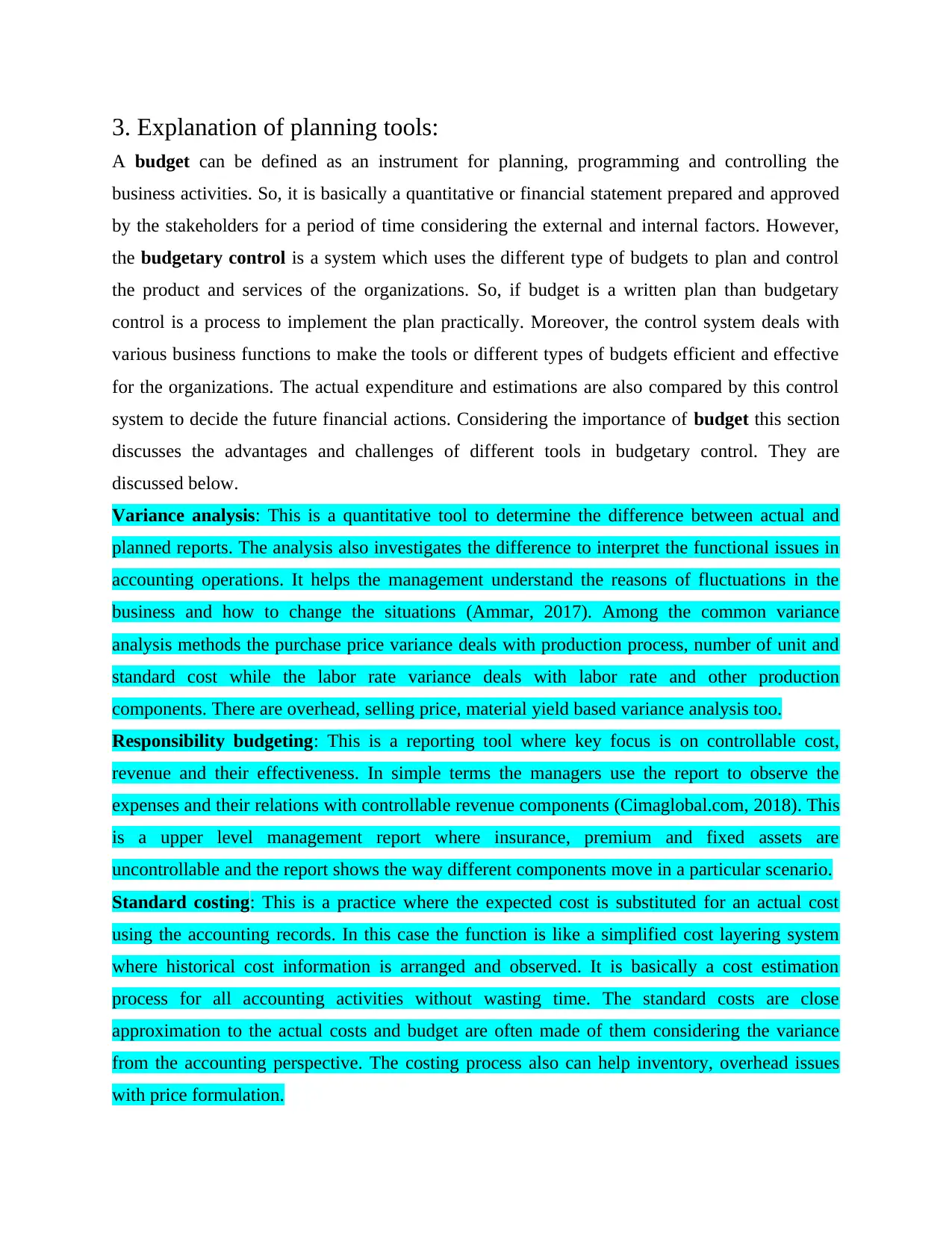
3. Explanation of planning tools:
A budget can be defined as an instrument for planning, programming and controlling the
business activities. So, it is basically a quantitative or financial statement prepared and approved
by the stakeholders for a period of time considering the external and internal factors. However,
the budgetary control is a system which uses the different type of budgets to plan and control
the product and services of the organizations. So, if budget is a written plan than budgetary
control is a process to implement the plan practically. Moreover, the control system deals with
various business functions to make the tools or different types of budgets efficient and effective
for the organizations. The actual expenditure and estimations are also compared by this control
system to decide the future financial actions. Considering the importance of budget this section
discusses the advantages and challenges of different tools in budgetary control. They are
discussed below.
Variance analysis: This is a quantitative tool to determine the difference between actual and
planned reports. The analysis also investigates the difference to interpret the functional issues in
accounting operations. It helps the management understand the reasons of fluctuations in the
business and how to change the situations (Ammar, 2017). Among the common variance
analysis methods the purchase price variance deals with production process, number of unit and
standard cost while the labor rate variance deals with labor rate and other production
components. There are overhead, selling price, material yield based variance analysis too.
Responsibility budgeting: This is a reporting tool where key focus is on controllable cost,
revenue and their effectiveness. In simple terms the managers use the report to observe the
expenses and their relations with controllable revenue components (Cimaglobal.com, 2018). This
is a upper level management report where insurance, premium and fixed assets are
uncontrollable and the report shows the way different components move in a particular scenario.
Standard costing: This is a practice where the expected cost is substituted for an actual cost
using the accounting records. In this case the function is like a simplified cost layering system
where historical cost information is arranged and observed. It is basically a cost estimation
process for all accounting activities without wasting time. The standard costs are close
approximation to the actual costs and budget are often made of them considering the variance
from the accounting perspective. The costing process also can help inventory, overhead issues
with price formulation.
A budget can be defined as an instrument for planning, programming and controlling the
business activities. So, it is basically a quantitative or financial statement prepared and approved
by the stakeholders for a period of time considering the external and internal factors. However,
the budgetary control is a system which uses the different type of budgets to plan and control
the product and services of the organizations. So, if budget is a written plan than budgetary
control is a process to implement the plan practically. Moreover, the control system deals with
various business functions to make the tools or different types of budgets efficient and effective
for the organizations. The actual expenditure and estimations are also compared by this control
system to decide the future financial actions. Considering the importance of budget this section
discusses the advantages and challenges of different tools in budgetary control. They are
discussed below.
Variance analysis: This is a quantitative tool to determine the difference between actual and
planned reports. The analysis also investigates the difference to interpret the functional issues in
accounting operations. It helps the management understand the reasons of fluctuations in the
business and how to change the situations (Ammar, 2017). Among the common variance
analysis methods the purchase price variance deals with production process, number of unit and
standard cost while the labor rate variance deals with labor rate and other production
components. There are overhead, selling price, material yield based variance analysis too.
Responsibility budgeting: This is a reporting tool where key focus is on controllable cost,
revenue and their effectiveness. In simple terms the managers use the report to observe the
expenses and their relations with controllable revenue components (Cimaglobal.com, 2018). This
is a upper level management report where insurance, premium and fixed assets are
uncontrollable and the report shows the way different components move in a particular scenario.
Standard costing: This is a practice where the expected cost is substituted for an actual cost
using the accounting records. In this case the function is like a simplified cost layering system
where historical cost information is arranged and observed. It is basically a cost estimation
process for all accounting activities without wasting time. The standard costs are close
approximation to the actual costs and budget are often made of them considering the variance
from the accounting perspective. The costing process also can help inventory, overhead issues
with price formulation.
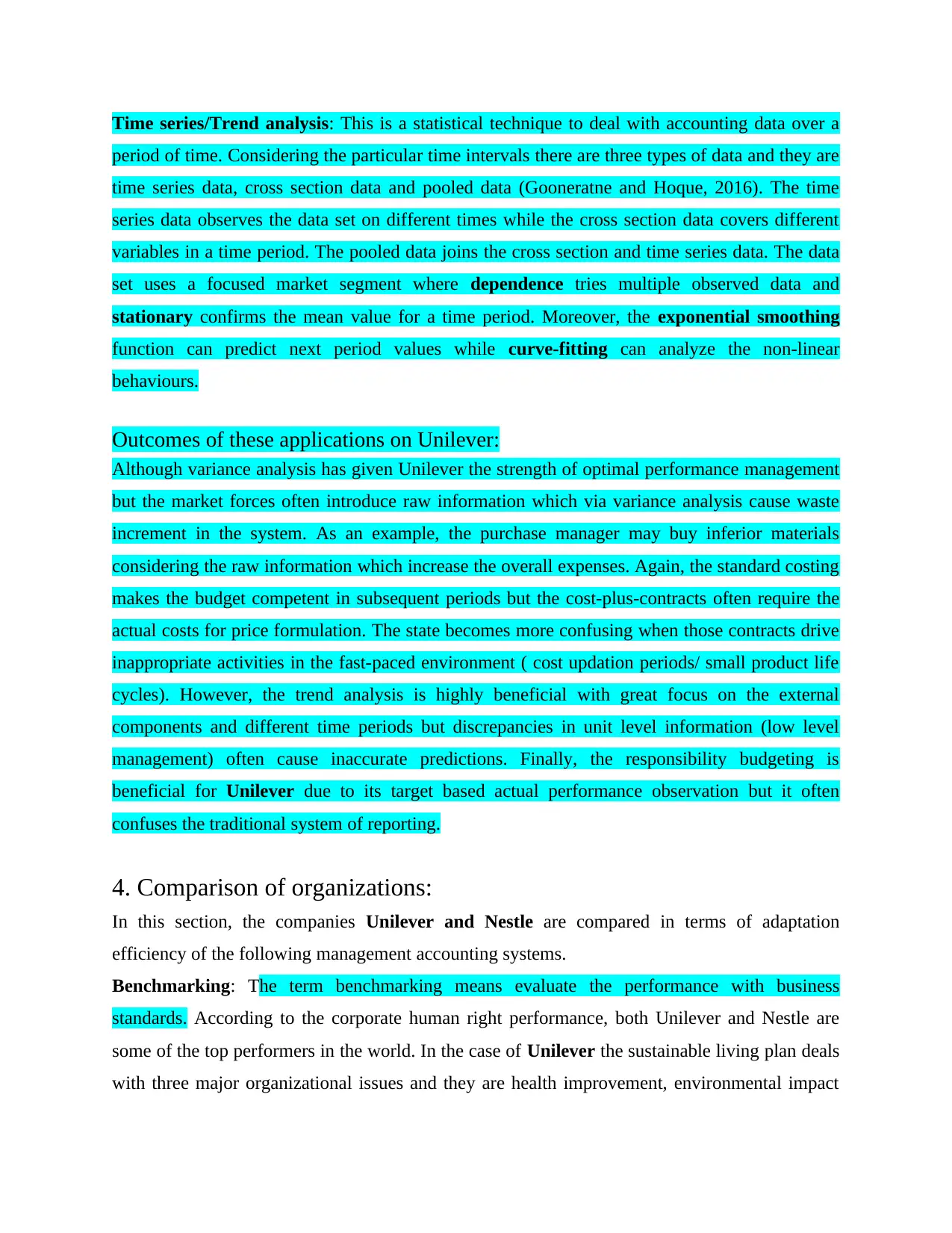
Time series/Trend analysis: This is a statistical technique to deal with accounting data over a
period of time. Considering the particular time intervals there are three types of data and they are
time series data, cross section data and pooled data (Gooneratne and Hoque, 2016). The time
series data observes the data set on different times while the cross section data covers different
variables in a time period. The pooled data joins the cross section and time series data. The data
set uses a focused market segment where dependence tries multiple observed data and
stationary confirms the mean value for a time period. Moreover, the exponential smoothing
function can predict next period values while curve-fitting can analyze the non-linear
behaviours.
Outcomes of these applications on Unilever:
Although variance analysis has given Unilever the strength of optimal performance management
but the market forces often introduce raw information which via variance analysis cause waste
increment in the system. As an example, the purchase manager may buy inferior materials
considering the raw information which increase the overall expenses. Again, the standard costing
makes the budget competent in subsequent periods but the cost-plus-contracts often require the
actual costs for price formulation. The state becomes more confusing when those contracts drive
inappropriate activities in the fast-paced environment ( cost updation periods/ small product life
cycles). However, the trend analysis is highly beneficial with great focus on the external
components and different time periods but discrepancies in unit level information (low level
management) often cause inaccurate predictions. Finally, the responsibility budgeting is
beneficial for Unilever due to its target based actual performance observation but it often
confuses the traditional system of reporting.
4. Comparison of organizations:
In this section, the companies Unilever and Nestle are compared in terms of adaptation
efficiency of the following management accounting systems.
Benchmarking: The term benchmarking means evaluate the performance with business
standards. According to the corporate human right performance, both Unilever and Nestle are
some of the top performers in the world. In the case of Unilever the sustainable living plan deals
with three major organizational issues and they are health improvement, environmental impact
period of time. Considering the particular time intervals there are three types of data and they are
time series data, cross section data and pooled data (Gooneratne and Hoque, 2016). The time
series data observes the data set on different times while the cross section data covers different
variables in a time period. The pooled data joins the cross section and time series data. The data
set uses a focused market segment where dependence tries multiple observed data and
stationary confirms the mean value for a time period. Moreover, the exponential smoothing
function can predict next period values while curve-fitting can analyze the non-linear
behaviours.
Outcomes of these applications on Unilever:
Although variance analysis has given Unilever the strength of optimal performance management
but the market forces often introduce raw information which via variance analysis cause waste
increment in the system. As an example, the purchase manager may buy inferior materials
considering the raw information which increase the overall expenses. Again, the standard costing
makes the budget competent in subsequent periods but the cost-plus-contracts often require the
actual costs for price formulation. The state becomes more confusing when those contracts drive
inappropriate activities in the fast-paced environment ( cost updation periods/ small product life
cycles). However, the trend analysis is highly beneficial with great focus on the external
components and different time periods but discrepancies in unit level information (low level
management) often cause inaccurate predictions. Finally, the responsibility budgeting is
beneficial for Unilever due to its target based actual performance observation but it often
confuses the traditional system of reporting.
4. Comparison of organizations:
In this section, the companies Unilever and Nestle are compared in terms of adaptation
efficiency of the following management accounting systems.
Benchmarking: The term benchmarking means evaluate the performance with business
standards. According to the corporate human right performance, both Unilever and Nestle are
some of the top performers in the world. In the case of Unilever the sustainable living plan deals
with three major organizational issues and they are health improvement, environmental impact
⊘ This is a preview!⊘
Do you want full access?
Subscribe today to unlock all pages.

Trusted by 1+ million students worldwide
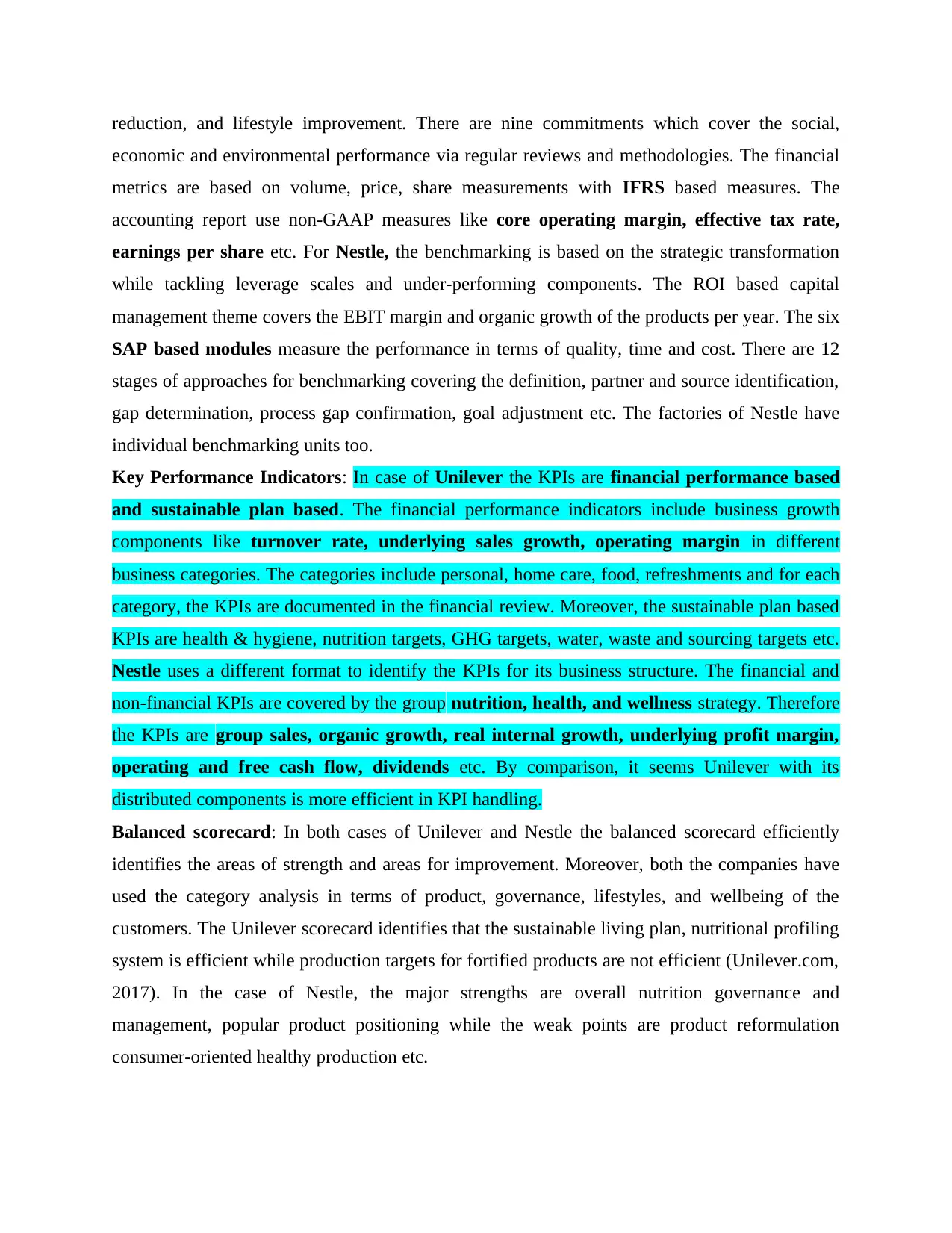
reduction, and lifestyle improvement. There are nine commitments which cover the social,
economic and environmental performance via regular reviews and methodologies. The financial
metrics are based on volume, price, share measurements with IFRS based measures. The
accounting report use non-GAAP measures like core operating margin, effective tax rate,
earnings per share etc. For Nestle, the benchmarking is based on the strategic transformation
while tackling leverage scales and under-performing components. The ROI based capital
management theme covers the EBIT margin and organic growth of the products per year. The six
SAP based modules measure the performance in terms of quality, time and cost. There are 12
stages of approaches for benchmarking covering the definition, partner and source identification,
gap determination, process gap confirmation, goal adjustment etc. The factories of Nestle have
individual benchmarking units too.
Key Performance Indicators: In case of Unilever the KPIs are financial performance based
and sustainable plan based. The financial performance indicators include business growth
components like turnover rate, underlying sales growth, operating margin in different
business categories. The categories include personal, home care, food, refreshments and for each
category, the KPIs are documented in the financial review. Moreover, the sustainable plan based
KPIs are health & hygiene, nutrition targets, GHG targets, water, waste and sourcing targets etc.
Nestle uses a different format to identify the KPIs for its business structure. The financial and
non-financial KPIs are covered by the group nutrition, health, and wellness strategy. Therefore
the KPIs are group sales, organic growth, real internal growth, underlying profit margin,
operating and free cash flow, dividends etc. By comparison, it seems Unilever with its
distributed components is more efficient in KPI handling.
Balanced scorecard: In both cases of Unilever and Nestle the balanced scorecard efficiently
identifies the areas of strength and areas for improvement. Moreover, both the companies have
used the category analysis in terms of product, governance, lifestyles, and wellbeing of the
customers. The Unilever scorecard identifies that the sustainable living plan, nutritional profiling
system is efficient while production targets for fortified products are not efficient (Unilever.com,
2017). In the case of Nestle, the major strengths are overall nutrition governance and
management, popular product positioning while the weak points are product reformulation
consumer-oriented healthy production etc.
economic and environmental performance via regular reviews and methodologies. The financial
metrics are based on volume, price, share measurements with IFRS based measures. The
accounting report use non-GAAP measures like core operating margin, effective tax rate,
earnings per share etc. For Nestle, the benchmarking is based on the strategic transformation
while tackling leverage scales and under-performing components. The ROI based capital
management theme covers the EBIT margin and organic growth of the products per year. The six
SAP based modules measure the performance in terms of quality, time and cost. There are 12
stages of approaches for benchmarking covering the definition, partner and source identification,
gap determination, process gap confirmation, goal adjustment etc. The factories of Nestle have
individual benchmarking units too.
Key Performance Indicators: In case of Unilever the KPIs are financial performance based
and sustainable plan based. The financial performance indicators include business growth
components like turnover rate, underlying sales growth, operating margin in different
business categories. The categories include personal, home care, food, refreshments and for each
category, the KPIs are documented in the financial review. Moreover, the sustainable plan based
KPIs are health & hygiene, nutrition targets, GHG targets, water, waste and sourcing targets etc.
Nestle uses a different format to identify the KPIs for its business structure. The financial and
non-financial KPIs are covered by the group nutrition, health, and wellness strategy. Therefore
the KPIs are group sales, organic growth, real internal growth, underlying profit margin,
operating and free cash flow, dividends etc. By comparison, it seems Unilever with its
distributed components is more efficient in KPI handling.
Balanced scorecard: In both cases of Unilever and Nestle the balanced scorecard efficiently
identifies the areas of strength and areas for improvement. Moreover, both the companies have
used the category analysis in terms of product, governance, lifestyles, and wellbeing of the
customers. The Unilever scorecard identifies that the sustainable living plan, nutritional profiling
system is efficient while production targets for fortified products are not efficient (Unilever.com,
2017). In the case of Nestle, the major strengths are overall nutrition governance and
management, popular product positioning while the weak points are product reformulation
consumer-oriented healthy production etc.
Paraphrase This Document
Need a fresh take? Get an instant paraphrase of this document with our AI Paraphraser
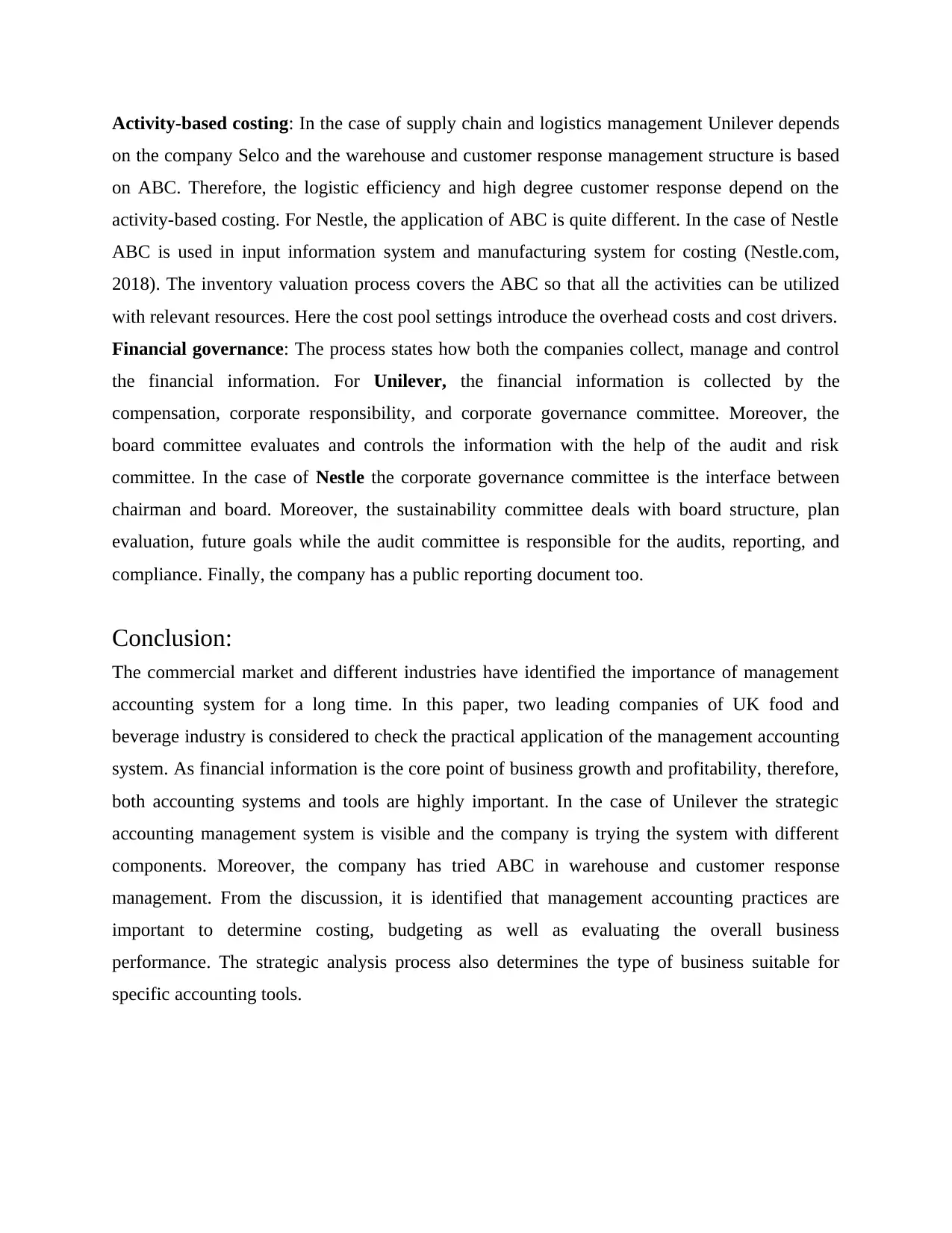
Activity-based costing: In the case of supply chain and logistics management Unilever depends
on the company Selco and the warehouse and customer response management structure is based
on ABC. Therefore, the logistic efficiency and high degree customer response depend on the
activity-based costing. For Nestle, the application of ABC is quite different. In the case of Nestle
ABC is used in input information system and manufacturing system for costing (Nestle.com,
2018). The inventory valuation process covers the ABC so that all the activities can be utilized
with relevant resources. Here the cost pool settings introduce the overhead costs and cost drivers.
Financial governance: The process states how both the companies collect, manage and control
the financial information. For Unilever, the financial information is collected by the
compensation, corporate responsibility, and corporate governance committee. Moreover, the
board committee evaluates and controls the information with the help of the audit and risk
committee. In the case of Nestle the corporate governance committee is the interface between
chairman and board. Moreover, the sustainability committee deals with board structure, plan
evaluation, future goals while the audit committee is responsible for the audits, reporting, and
compliance. Finally, the company has a public reporting document too.
Conclusion:
The commercial market and different industries have identified the importance of management
accounting system for a long time. In this paper, two leading companies of UK food and
beverage industry is considered to check the practical application of the management accounting
system. As financial information is the core point of business growth and profitability, therefore,
both accounting systems and tools are highly important. In the case of Unilever the strategic
accounting management system is visible and the company is trying the system with different
components. Moreover, the company has tried ABC in warehouse and customer response
management. From the discussion, it is identified that management accounting practices are
important to determine costing, budgeting as well as evaluating the overall business
performance. The strategic analysis process also determines the type of business suitable for
specific accounting tools.
on the company Selco and the warehouse and customer response management structure is based
on ABC. Therefore, the logistic efficiency and high degree customer response depend on the
activity-based costing. For Nestle, the application of ABC is quite different. In the case of Nestle
ABC is used in input information system and manufacturing system for costing (Nestle.com,
2018). The inventory valuation process covers the ABC so that all the activities can be utilized
with relevant resources. Here the cost pool settings introduce the overhead costs and cost drivers.
Financial governance: The process states how both the companies collect, manage and control
the financial information. For Unilever, the financial information is collected by the
compensation, corporate responsibility, and corporate governance committee. Moreover, the
board committee evaluates and controls the information with the help of the audit and risk
committee. In the case of Nestle the corporate governance committee is the interface between
chairman and board. Moreover, the sustainability committee deals with board structure, plan
evaluation, future goals while the audit committee is responsible for the audits, reporting, and
compliance. Finally, the company has a public reporting document too.
Conclusion:
The commercial market and different industries have identified the importance of management
accounting system for a long time. In this paper, two leading companies of UK food and
beverage industry is considered to check the practical application of the management accounting
system. As financial information is the core point of business growth and profitability, therefore,
both accounting systems and tools are highly important. In the case of Unilever the strategic
accounting management system is visible and the company is trying the system with different
components. Moreover, the company has tried ABC in warehouse and customer response
management. From the discussion, it is identified that management accounting practices are
important to determine costing, budgeting as well as evaluating the overall business
performance. The strategic analysis process also determines the type of business suitable for
specific accounting tools.
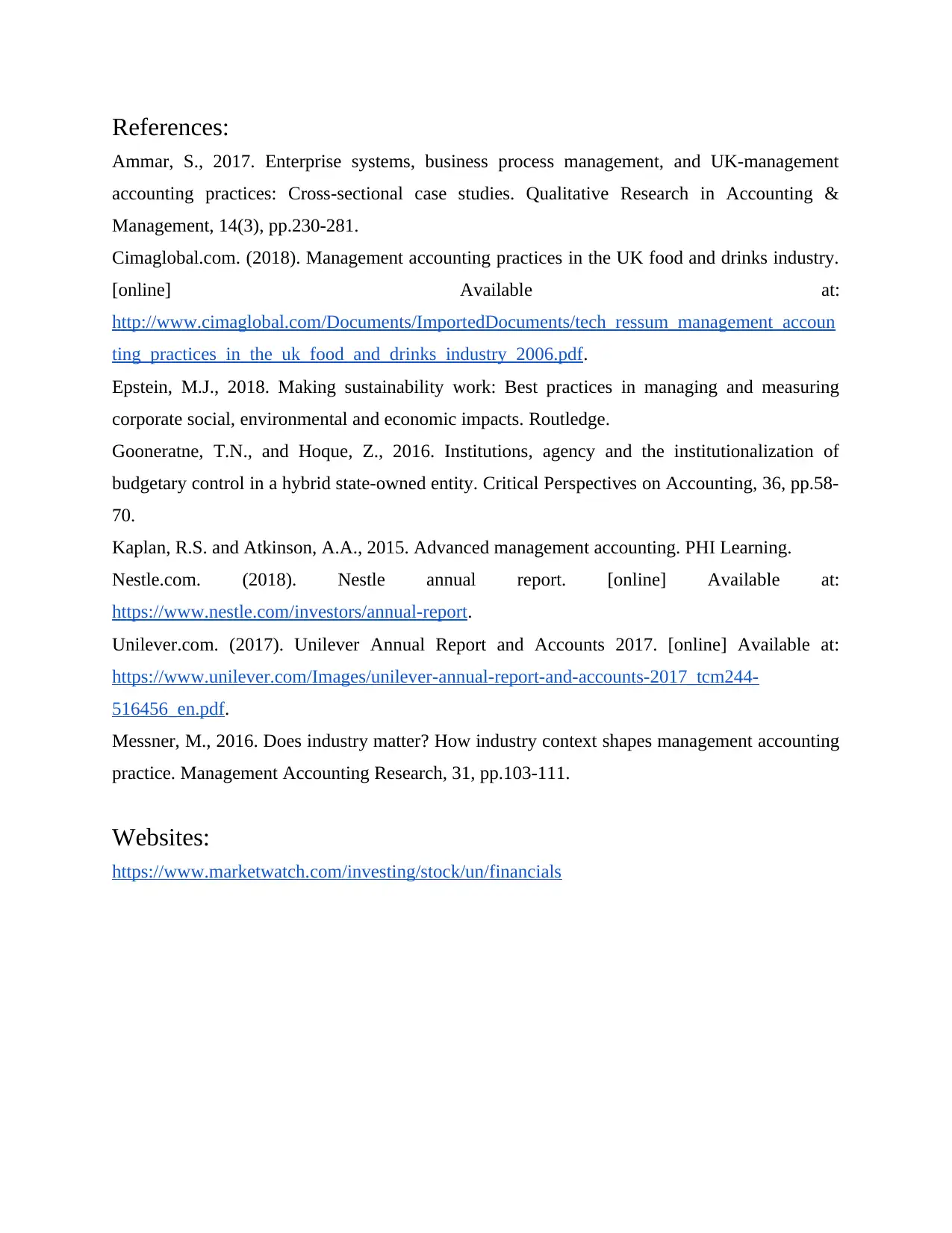
References:
Ammar, S., 2017. Enterprise systems, business process management, and UK-management
accounting practices: Cross-sectional case studies. Qualitative Research in Accounting &
Management, 14(3), pp.230-281.
Cimaglobal.com. (2018). Management accounting practices in the UK food and drinks industry.
[online] Available at:
http://www.cimaglobal.com/Documents/ImportedDocuments/tech_ressum_management_accoun
ting_practices_in_the_uk_food_and_drinks_industry_2006.pdf.
Epstein, M.J., 2018. Making sustainability work: Best practices in managing and measuring
corporate social, environmental and economic impacts. Routledge.
Gooneratne, T.N., and Hoque, Z., 2016. Institutions, agency and the institutionalization of
budgetary control in a hybrid state-owned entity. Critical Perspectives on Accounting, 36, pp.58-
70.
Kaplan, R.S. and Atkinson, A.A., 2015. Advanced management accounting. PHI Learning.
Nestle.com. (2018). Nestle annual report. [online] Available at:
https://www.nestle.com/investors/annual-report.
Unilever.com. (2017). Unilever Annual Report and Accounts 2017. [online] Available at:
https://www.unilever.com/Images/unilever-annual-report-and-accounts-2017_tcm244-
516456_en.pdf.
Messner, M., 2016. Does industry matter? How industry context shapes management accounting
practice. Management Accounting Research, 31, pp.103-111.
Websites:
https://www.marketwatch.com/investing/stock/un/financials
Ammar, S., 2017. Enterprise systems, business process management, and UK-management
accounting practices: Cross-sectional case studies. Qualitative Research in Accounting &
Management, 14(3), pp.230-281.
Cimaglobal.com. (2018). Management accounting practices in the UK food and drinks industry.
[online] Available at:
http://www.cimaglobal.com/Documents/ImportedDocuments/tech_ressum_management_accoun
ting_practices_in_the_uk_food_and_drinks_industry_2006.pdf.
Epstein, M.J., 2018. Making sustainability work: Best practices in managing and measuring
corporate social, environmental and economic impacts. Routledge.
Gooneratne, T.N., and Hoque, Z., 2016. Institutions, agency and the institutionalization of
budgetary control in a hybrid state-owned entity. Critical Perspectives on Accounting, 36, pp.58-
70.
Kaplan, R.S. and Atkinson, A.A., 2015. Advanced management accounting. PHI Learning.
Nestle.com. (2018). Nestle annual report. [online] Available at:
https://www.nestle.com/investors/annual-report.
Unilever.com. (2017). Unilever Annual Report and Accounts 2017. [online] Available at:
https://www.unilever.com/Images/unilever-annual-report-and-accounts-2017_tcm244-
516456_en.pdf.
Messner, M., 2016. Does industry matter? How industry context shapes management accounting
practice. Management Accounting Research, 31, pp.103-111.
Websites:
https://www.marketwatch.com/investing/stock/un/financials
⊘ This is a preview!⊘
Do you want full access?
Subscribe today to unlock all pages.

Trusted by 1+ million students worldwide
1 out of 14
Related Documents
Your All-in-One AI-Powered Toolkit for Academic Success.
+13062052269
info@desklib.com
Available 24*7 on WhatsApp / Email
![[object Object]](/_next/static/media/star-bottom.7253800d.svg)
Unlock your academic potential
Copyright © 2020–2026 A2Z Services. All Rights Reserved. Developed and managed by ZUCOL.





